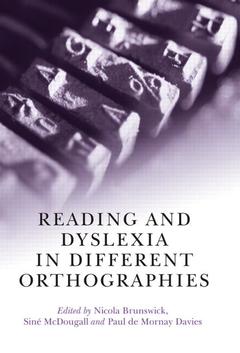Reading and Dyslexia in Different Orthographies
Coordonnateurs : Brunswick Nicola, McDougall Sine, de Mornay Davies Paul

This book provides a unique and accessible account of current research on reading and dyslexia in different orthographies. While most research has been conducted in English, this text presents cross-language comparisons to provide insights into universal aspects of reading development and developmental dyslexia in alphabetic and non-alphabetic languages.
The book brings together contributions from a group of leading literacy researchers from around the world. It begins by examining the development of language skills in monolingual speakers of alphabetic and non-alphabetic languages; it then explores literacy acquisition in bilingual children learning to read in languages with different spelling-sound rules, including English, French, Greek, Welsh and Japanese. The second section is devoted to developmental dyslexia in monolingual and bilingual speakers of different languages and examines the impact of variations in orthography on the symptoms and aetiology of dyslexia. The final section explores the contribution of brain imaging to the study of impaired and unimpaired reading, giving an up-to-the-minute picture of how the brain deals with different languages and writing systems.
This is ideal reading for advanced undergraduates and postgraduates who have an interest in language acquisition, reading and spelling, as well as speech and language therapists, teachers and special educational needs professionals.
U. Frith, Foreword. Part 1. The Development of Reading Skills in Different Orthographies. S. McDougall, N. Brunswick, P. de Mornay Davies, Reading and Dyslexia in Different Orthographies: An Introduction and Overview. U. Goswami, A Psycholinguistic Grain Size View of Reading Acquisition Across Languages. L.G. Duncan, Phonological Development from a Cross-Linguistic Perspective. M. Ktori, N. Pitchford, Letter Positioning Encoding Across Deep and Transparent Orthographies. J.R. Hanley, Differences in Reading Ability Between Children Attending Welsh and English-Speaking Primary Schools in Wales. T. Nunes, D. Burman, D. Evans, D. Bell, Writing a Language you Can't Hear. Part 2. Developmental Dyslexia in Different Orthographies.N. Brunswick, Unimpaired Reading Development and Dyslexia Across Different Languages. R. Davies, F. Cuetos, Reading Acquisition and Dyslexia in Spanish. D. Paizi, P. Zoccolotti, C. Burani, Lexical Reading in Italian Developmental Dyslexic Readers. I. Su, K. Klingebiel, B. Weekes, Dyslexia in Chinese: Implications for Connectionist Models of Reading. J. Everett, D. Ocampo, K. Veii, S. Nenopoulou, I. Smythe, H. al Mannai, G. Elbeheri, Dyslexia in Biscriptal Readers. Part 3. Neuroimaging Studies of Reading in Different Orthographies. E. Paulesu, N. Brunswick, F. Paganelle, Cross-Cultural Differences in Normal and Dyslexic Reading: Behavioural and Functional Anatomical Observations in Readers of Regular and Irregular Orthographies. B. Weekes, Lexical Retrieval in Alphabetic and Non-Alphabetic Scripts: Evidence From Brain Imaging.
Nicola Brunswick is Senior Lecturer in Psychology at Middlesex University. Her research explores cognitive and psychophysiological aspects of reading development and developmental dyslexia in children and adults. She is a trustee of the British Dyslexia Association.
Siné McDougall is Professor of Psychology at Bournemouth University. Her research examines the phonological and memory skills that children need to learn to read successfully and how difficulties with reading acquisition might be overcome through appropriate intervention. Her work has also examined the factors influencing the way we interpret the icons, symbols and signs that we encounter in our everyday lives.
Paul de Mornay Davies is Senior Lecturer in Psychology at Middlesex University. His research is focused on acquired disorders of language following brain damage, and in particular how the surface structure of the language spoken impacts on the ability to access meaning from sound and print.
Date de parution : 11-2012
15.6x23.4 cm
Date de parution : 05-2010
15.6x23.4 cm
Thème de Reading and Dyslexia in Different Orthographies :
Mots-clés :
Transparent Orthographies; transparent; Dyslexic Readers; readers; Developmental Dyslexia; developmental; Phonological Awareness; phonological; Deep Orthographies; awareness; Reading Aloud; deep; Non-alphabetic Scripts; orthographic; Orthographic Depth; depth; Non-lexical Route; children; Phoneme Awareness; lexical; Non-dyslexic Readers; Letter Position Encoding; Grapheme Phoneme Correspondences; Orthographic Facilitation; Early Orthographic Processing; Solar Model; De Zubicaray; Phonetic Radical; Spelling Sound Mappings; Deaf Children; SERIOL Model; Orthographic Depth Hypothesis; Welsh Children; Written Word Recognition; Phonological Dyslexia



